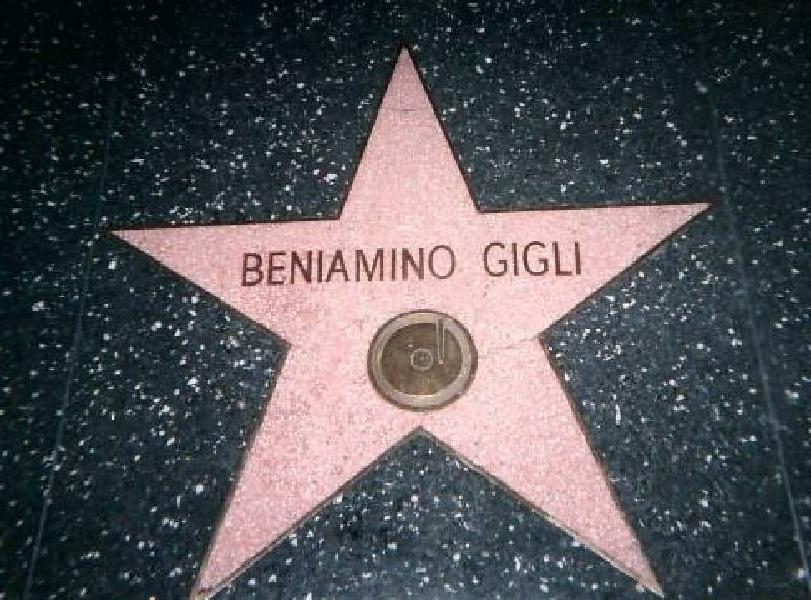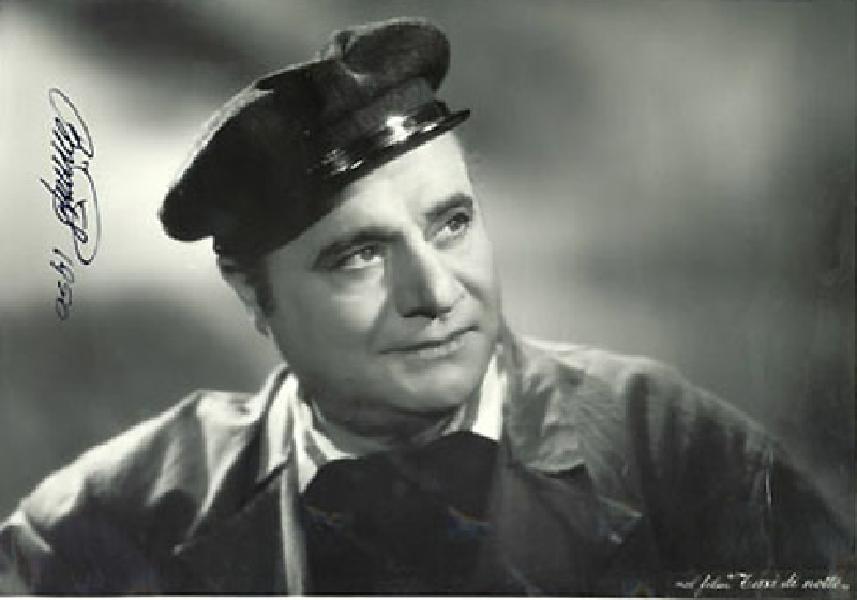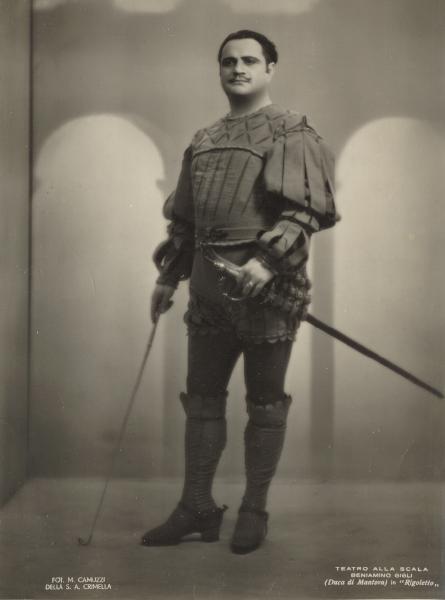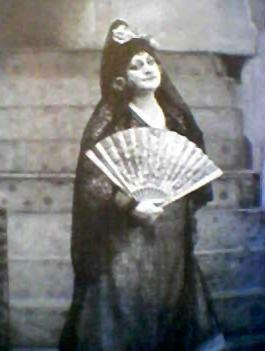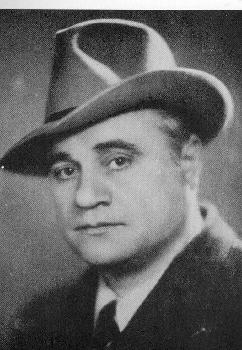Beniamino Gigli
I wish to thank Thomas Silverbörg for the picture.
I wish to thank Vladimir Efimenko for the picture.
I would like to thank Thomas Silverbörg for the recordings (Forza, Trovatore/Di geloso amor).
I wish to thank Vladimir Efimenko for the picture.
As long as I was childish enough to make such lists at all, Beniamino Gigli was always my number one
tenor. And still, decades later, it's special for me to hear his voice, which he produced with almost supernatural beauty. As
someone knowledgeable once said: when you play the first Gigli recording of the evening, it's always as if you heard him for
the very first time in your life. I know it all: he is exceedingly sentimental, he sobs like nobody else, he has absolutely
no legato, his acuti are not always what you'd wish them to be, and in verismo music (or in any music, in his later years),
he has an unfortunate tendency to bleaching his incomparable timbre to a white that blinds the ear. And yet, no other singer
(not just no other tenor) ever had so many colors in his or her voice, and used them so sapiently; he never bores, and if he
is sentimental, it's authentic and not histrionic.
Born into a poor family, and without any professional training, Gigli had to do hard unqualified work from an early age. He
sang in the cathedral choir in nearby Loreto, already as a boy soprano; and obviously, he did that so successfully that after
the breaking of his voice, he continued to sing soprano, in falsetto. A local butcher, who was a great opera lover,
introduced the young man to Bernardo De Muro, and to De Muro's utter astonishment,
Gigli sang two arias for him – Mimì's from La bohème and Santuzza's from Cavalleria
rusticana! "Are you a boy or a girl?", snapped De Muro; but he recognized the strange young guy's talent, and told him
that he was a tenor, and should study voice professionally. He did, first locally, but eventually with a grant at the Rome
Accademia di Santa Cecilia, with Antonio Cotogni and Enrico Rosati.
In 1914, he won a competition in Parma (Bonci was in the jury, and sold on Gigli),
and made his debut as Enzo Grimaldo in Rovigo. His career was quick to develop: the same year, he was already in Genova, and
soon in Bologna, Palermo (Teatro Massimo, 1915), Naples (Teatro San Carlo) and Rome (1916); in 1917 in Madrid and Barcelona.
His first signature role was Boito's Faust, soon followed by Flammen in Lodoletta; in the latter role, he was so
successful at the Teatro Lirico in Milano that Toscanini hired him for La Scala in 1918 (his debut there was in
Mefistofele again).
What followed, was one of the best operatic careers ever: between 1919 and 1951, he made guest appearances at the Teatro
Colón in Buenos Aires, Rio de Janeiro (very regularly), Monte Carlo, at the Paris Opéra, in Berlin, Dresden,
Stuttgart, Cologne, at the Vienna Staatsoper, at Covent Garden in London, Copenhagen, Budapest, Zürich and Bilbao, at
the Arena di Verona or at the Terme di Caracalla in Rome (in their very first season, 1937, as Radamès).
From November 1920 to April 1932, he sang permanently at the New York Met; it's more than well-known that he left because he
felt underpaid. He returned for a few performances in 1939 – a total of 510 Met appearances!
From 1932 to 1943, his new homebase was La Scala. He was way too close with Mussolini's Fascist regime, which seriously
damaged his post-war reputation in Italy.
His operatic repertory was vast, from Don Ottavio and Duca to Radamès and Chénier, from Massenet's to Puccini's des
Grieux. Not to forget loads of Neapolitan canzoni, folk and pop songs – and lots of hugely successful films, although
he was a lousy actor. Many of those films were shot in Nazi Germany, another criminal regime he came too close. And yet Gigli
was certainly no fanatic, but a jovial and kindhearted person (his autobiography is a very winsome read); it would seem
that his urge to be loved and celebrated just didn't discriminate, loved by whom.
Being a celebrity had an irresistible charm for him. In the town of Recanati, where he had grown up in such humble
circumstances, he had a villa built (it's still standing) with 23 bathrooms. His tomb, on the Recanati cemetery, is
pyramid-shaped so as to remember one of his signature roles, Radamès.
Gigli's last operatic performances were in 1952, his last concerts in 1955. As far as his discography, recordings from his
prime abound, and yet his legacy is somewhat marred by too many late recordings – some studio discs, but above all,
countless live recordings of his last opera performances and his many farewell concerts. There are still some jewels among
them, but most (like the above "Nessun dorma", "Invano, Alvaro" and "Di geloso amor" renditions) prove that records by
senior singers should be seen rather than heard.
Reference 1: Gottfried Cervenka on the website of the Austrian quality radio station Ö1; reference 2: Giacomo Lauri-Volpi, Voci parallele, Milano 1955; reference 3: Kutsch &
Riemens
La Gioconda – Rovigo, Sociale, 15 October 1914 Manon – Genova, Carlo Felice, 26 December 1914 Tosca – Genova, Carlo Felice, 19 January 1915 Mefistofele – Palermo, Massimo, 1 April 1915 Cavalleria rusticana – Napoli, San Carlo, 11 January 1916 La favorite – Napoli, Bellini, 12 April 1916 Lucia di Lammermoor – Verona, Ristori, 5 October 1916 Iris – Torino, Chiarella, 8 February 1917 L'amico Fritz (act 2) – Torino, Chiarella, 12 February 1917 Lodoletta – Livorno, Politeama, 28 July 1917 La rondine – Roma, Costanzi, 10 January 1918 Adriana Lecouvreur – Roma, Costanzi, 30 April 1918 Fedora – Napoli, San Carlo, 19 February 1919 La bohème – Monte Carlo, Grand Théâtre, 9 March 1919 La traviata – Monte Carlo, Grand Théâtre, 18 March 1919 Lucrezia Borgia – Buenos Aires, Colón, 15 July 1919 L'amore dei tre re – Monte Carlo, Grand Théâtre, 2 March 1920 Rigoletto – Monte Carlo, Grand Théâtre, 11 March 1920 Madama Butterfly – Monte Carlo, Grand Théâtre, 3 April 1920 Lohengrin – Rio de Janeiro, Municipal, 28 June 1920 Loreley – Rio de Janeiro, Municipal, 16 July 1920 Francesca da Rimini – São Paulo, Municipal, 18 August 1920 Andrea Chénier – Philadelphia, Academy of Music, 1 March 1921 Il piccolo Marat – Buenos Aires, Coliseo, 20 September 1921 Le roi d'Ys – New York, Met, 5 January 1922 Manon Lescaut – New York, Met, 18 March 1922 Roméo et Juliette – New York, Met, 25 November 1922 L'Africaine – New York, Met, 21 March 1923 Martha – New York, Met, 14 December 1923 I compagnacci – New York, Met, 2 January 1924 Falstaff – New York, Met, 2 January 1925 La cena delle beffe – Buenos Aires, Colón, 28 August 1925 Mignon – New York, Met, 10 March 1927 Un ballo in maschera – Buenos Aires, Colón, 18 July 1928 L'elisir d'amore – Buenos Aires, Colón, 10 August 1928 Don Giovanni – New York, Met, 29 November 1929 La sonnambula – New York, Met, 16 March 1932 Evangelina – Philadelphia, Mitten Memorial, 28 May 1932 La forza del destino – Buenos Aires, Colón, 4 July 1933 Il pirata – Roma, dell'Opera, 1 January 1935 Faust – Rio de Janeiro, Municipal, 10 September 1935 Aida – Roma, dell'Opera, 28 March, 1937 Il Guarany – Roma, dell'Opera, 15 April 1937 L'amico Fritz – Roma, dell'Opera, 23 December 1937 Gloria – Roma, dell'Opera, 15 January 1938 Il trovatore – Roma, dell'Opera, 9 December 1939 Zazà – Milano, Scala, 10 April 1940 Maristella – Milano, Scala, 25 April 1940 Isabeau – Torino, EIAR, 8 September 1940 Poliuto – Milano, Scala, 26 December 1940 L'arlesiana – Roma, dell'Opera, 3 February 1941 Don Giovanni di Manara – Firenze, Comunale, 28 May, 1941 Carmen – Roma, dell'Opera, 24 December 1941 Pagliacci – Roma, dell'Opera, 4 April 1942 Norma – Catania, Bellini, 8 November 1945 Il giudizio universale – Roma, Università Gregoriana, 4 May 1950 Historia di Ezechia – Roma, Oratorio del SS. Crocefisso, 1953 Reference: Giuseppe Pugliese Gigli, Matteo Editore, 1990 |
